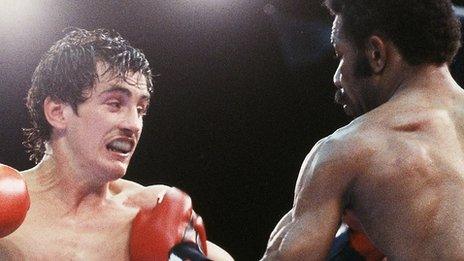The McGuigans: How the 'Clones Cyclone' forged a fighting dynasty
- Published
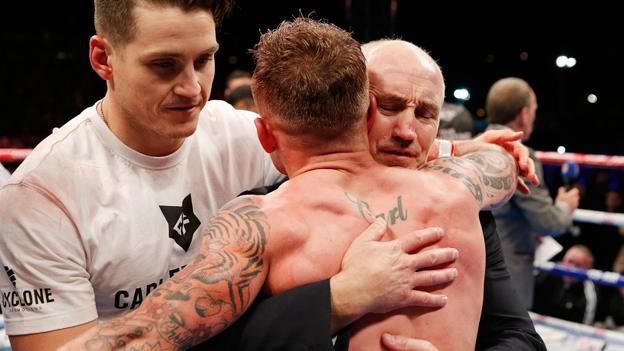
Shane and Barry McGuigan have helped Carl Frampton become a world star
"If someone had said to me 20 years ago that someday I would have my own family boxing business with two sons promoting, my other son as a coach and my wife providing an overview of the whole operation, I would have said 'lock that person up'."
Former WBA featherweight world champion and boxing 'hall of famer' Barry McGuigan is reflecting on how he moved from being a world-class boxer to head of a family promotional and training business that is gaining a burgeoning reputation in the hardest game and is the subject of the BBC documentary series Fight Game: The McGuigans.
"Boxing is such a tough business and it's often not a nice business and people fall out all the time. There's so much jealousy," he says.
Face Frampton in virtual reality

Step inside the ropes at the McGuigan Gym as trainer Shane talks you through a flurry of punches from his champion boxer Carl Frampton.
Triumph and tragedy
McGuigan is an authority on the tough side of boxing having endured his share of harrowing lows alongside the glittering highs as a fighter.
The Clones Cyclone, as he was known, became a cult hero, proving a unifying force during the Northern Ireland Troubles due to his ability to cross the sectarian divide and appeal to both sections of the community, even choosing to have Danny Boy played before his fights rather than the British or Irish anthems.
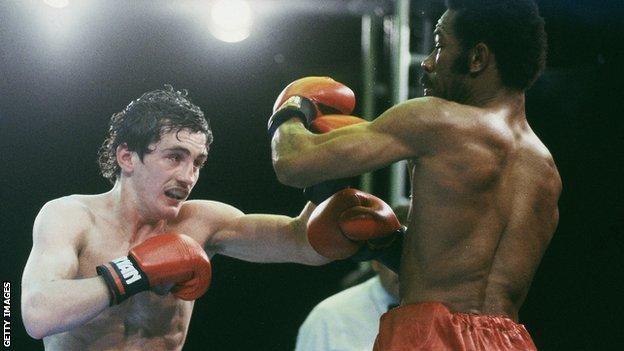
McGuigan became a superstar when he defeated Eusebio Pedroza in 1985
His greatest moment in the ring came when he defeated the legendary featherweight world champion Eusebio Pedroza, on a memorable night at London's Loftus Road stadium, watched by a record television audience of 19 million with a crowd of 75,000 providing a raucous welcome for him on his return to Belfast.
But McGuigan also experienced the devastating post-fight death of one of his opponents, Nigerian Young Ali, following a fight in 1982 and lost his world-title to Mexican Steve Cruz in 1986 when he wilted in the crucifying 120 degrees heat under the arc-lights in their fight in an open-air car park at Caesars Palace, Las Vegas.
He then went through a lengthy, costly lawsuit with his former manager Barney Eastwood, following their acrimonious split, which led Barry by his own admission to fall out of love with boxing for a period, at a time when also he lost his father to cancer. He would also later endure the heartache of his brother Dermot's suicide in 1994, and his daughter Danika's battle with leukaemia, from which she made a full recovery.
McGuigan reflects that boxing can often end in sadness: "Every fighter has a story that could break your heart. The losses are hard to deal with and retirement can prove very difficult.
"Many fighters don't know how to deal with life after boxing - how to replace the buzz of the ring, so they turn to drink, drugs or other destructive behaviour."
'Who is this kid?'
Thankfully this fate didn't befall McGuigan, as his ability in the ring was matched by a knowledge of the sport and his eloquence in commentating on it. So he quickly took up a role as a commentator for ITV, which led to a lengthy career as a boxing pundit.
But eventually this ran its course and the Clones man was ready for a new challenge. He had been asked to look after many fighters over the years and had always declined until he came across "the most exciting talent I'd seen in 30 years".
"It was at the EU Amateur Boxing Championships in Dublin when I happened to watch a featherweight fight, and I was struck by the talent of one of the fighters, so I said to my colleague 'Who is this kid?'"
They found out he was called Carl Frampton, and was from Belfast, so McGuigan went over to meet him later that day. He knew from the first time he saw him fight that Frampton was going to be a superstar.
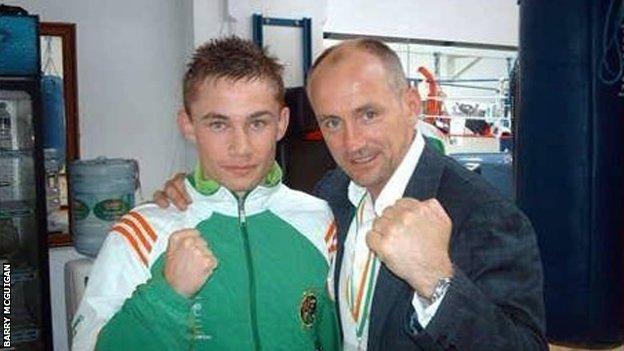
The day a star was born: Barry McGuigan meets a fresh-faced Carl Frampton for the first time
"Everything changed when I saw Carl Frampton for the first time," says McGuigan, who was struck by the parallels between them.
"I just thought he's my weight, featherweight, he's a Protestant going out with a Catholic girl - while I'm a Catholic married to a Protestant - and he's from loyalist Tigers Bay, with cross-community support, and he had such huge potential - I had goose bumps."
Barry and his wife Sandra started their own promotional company, Cyclone Promotions, with Frampton their first signing, and they brought him over to England to train.
McGuigan was convinced Frampton would get right to the top, and has been proven correct with 'The Jackal' since becoming a two-weight world champion.
Family business
But McGuigan's stable is bigger than just Frampton, with a number of exciting fighters including current European Middleweight Champion Conrad Cummings and the highly-rated Josh Taylor, who became Commonwealth Super-Lightweight Champion in just his ninth fight, and who McGuigan is convinced will become a world star.
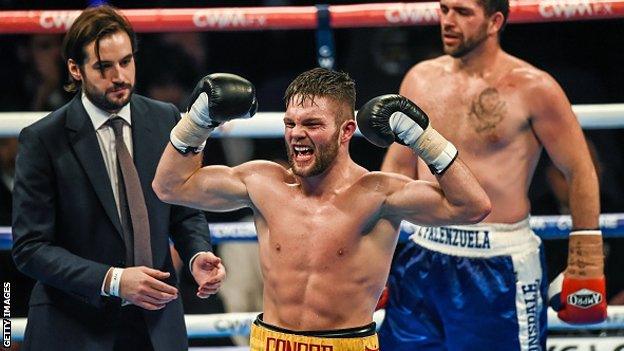
Conrad Cummings celebrating in the ring with promoter Blain McGuigan
He explains how the family business operates: "Shane is the coach and Blain and Jake are promoters. I want things done a certain way, but they're grown men and are intelligent, so I leave them to do their jobs. I say what I want for my fighter, and Jake and Blain go out and try to make that happen."
"Shane is a fabulous coach, and I don't need to tell him anything. He's gone way above my ability as a coach. On occasion he likes to sound things out with me. But sometimes I say too much, and he'll say 'now please stop it dad, shut up'.
Shane McGuigan, who was an amateur boxer but gave up fighting as he didn't want constant comparisons with his father, became one of the youngest coaches in history to train a world champion, aged 25. Shane, who also trains WBA super-middleweight world champion George Groves, has taken an innovative approach to the trade.
Instead of hiring specialists, he looks after the strength, nutrition and conditioning side of things as well as all the tactical aspects of coaching.
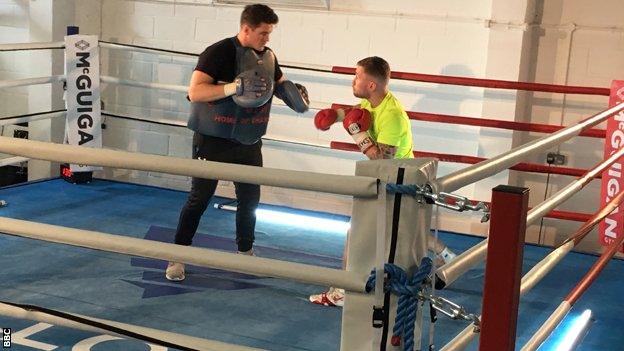
Frampton training with Shane in the McGuigans' newly acquired gym in Wandsworth, London
There are many factors that make up a great boxing coach, as Barry explains: "You need an innate ability to understand fighters, to get their trust and work with different personalities. Some you can shout at and cajole, with others requiring love and attention.
"So you have to be a psychologist, a tactical and technical expert, and regularly come up with new drills. It's very physically draining - Shane will frequently do 14-hour days and endless rounds holding the pads, which puts a real strain on your body."
Bonds and brutality
It is clear there a close bond between the fighters in their gym and Barry has an ethos for hiring fighters: "I don't care how talented they are I really don't want to work with fighters I don't like. I only want to work with guys I like, so that's a narrow band, but that allows me to get the best out of them.
"Frampton, for example, is a fantastic young man. We try to cultivate a behaviour pattern and encourage fighters to have self-respect and respect for others."

Jake, Barry and Shane McGuigan all play key roles in the family business
So, does he have any regrets about investing so much of his own life, and that of his family, in as bruising a business as boxing?
"No. Because, although sometimes we drive each other mad, it's also hugely gratifying. The greatest thrill in the world is to work with your family and your children - people you can trust.
"Boxing is not something you can easily walk away from - it's brutal but I love it. Boxing is the honesty business. Half a second and you're knocked out, you're looking up at the stars and it's over."
Fight Game: The McGuigans - catch up with all three parts of the documentary series on the BBC iPlayer
Fight Game VR - get into the ring with Carl Frampton in virtual reality
- Published15 May 2017
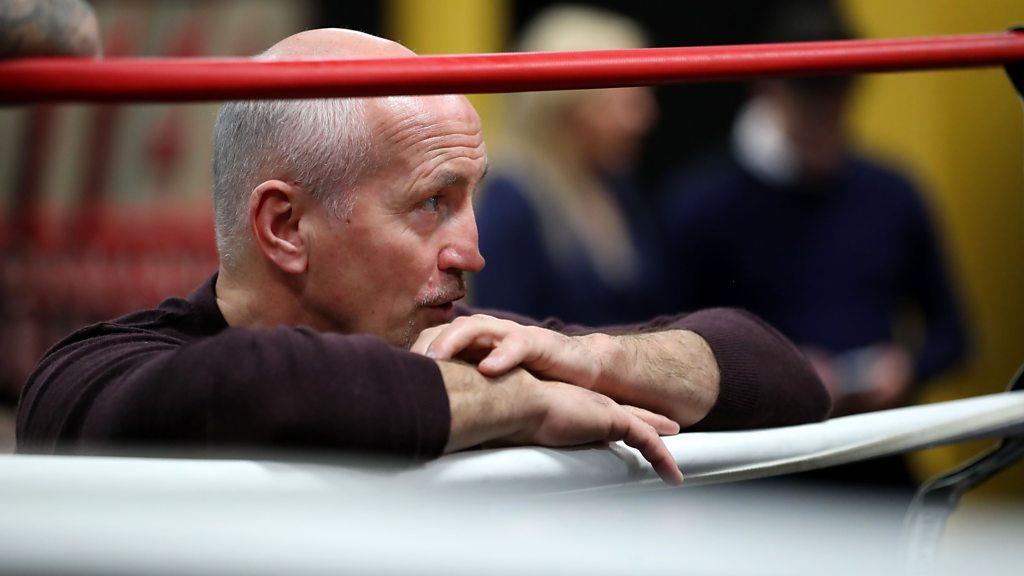
- Published30 May 2017
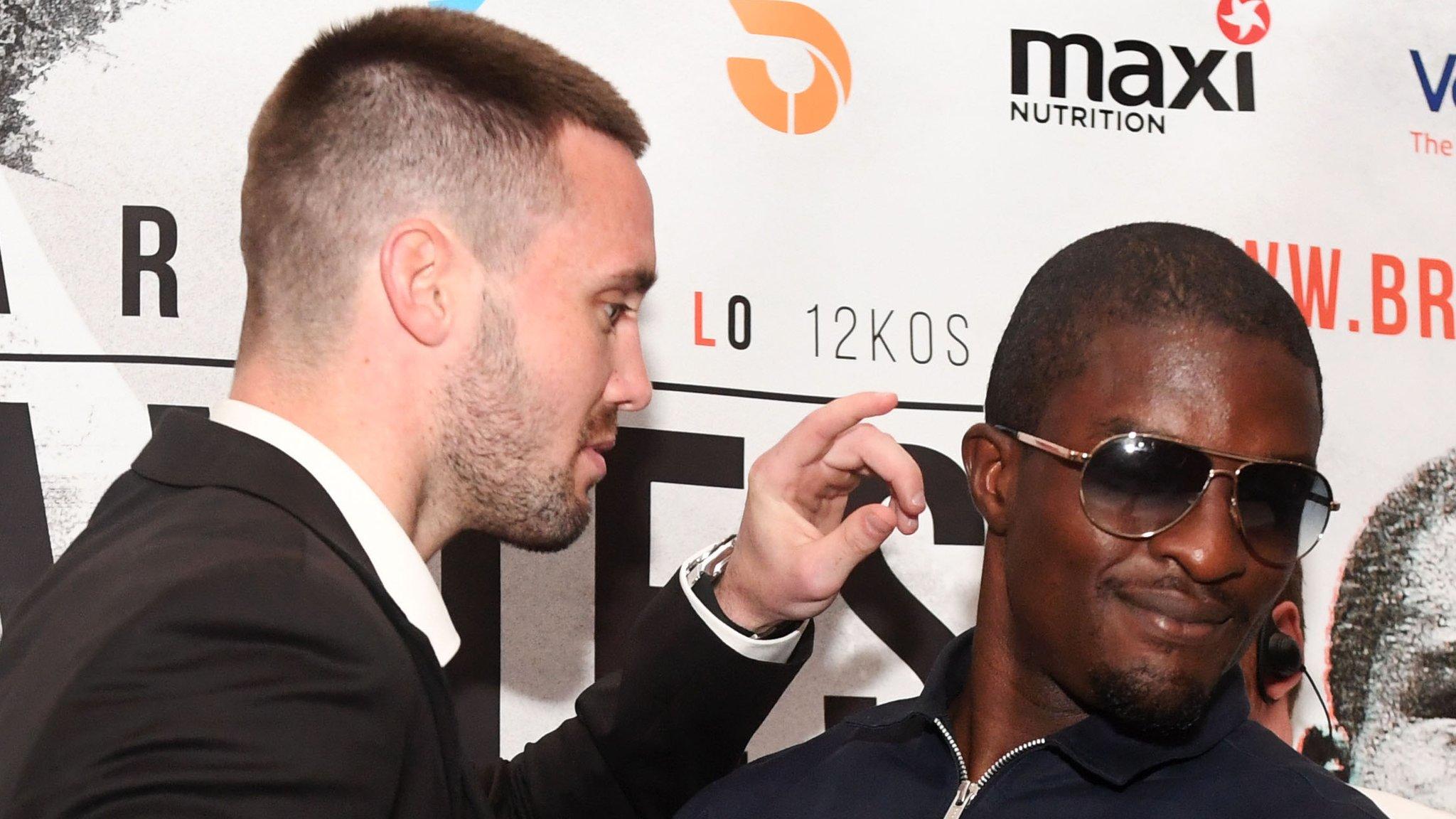
- Published31 January 2017
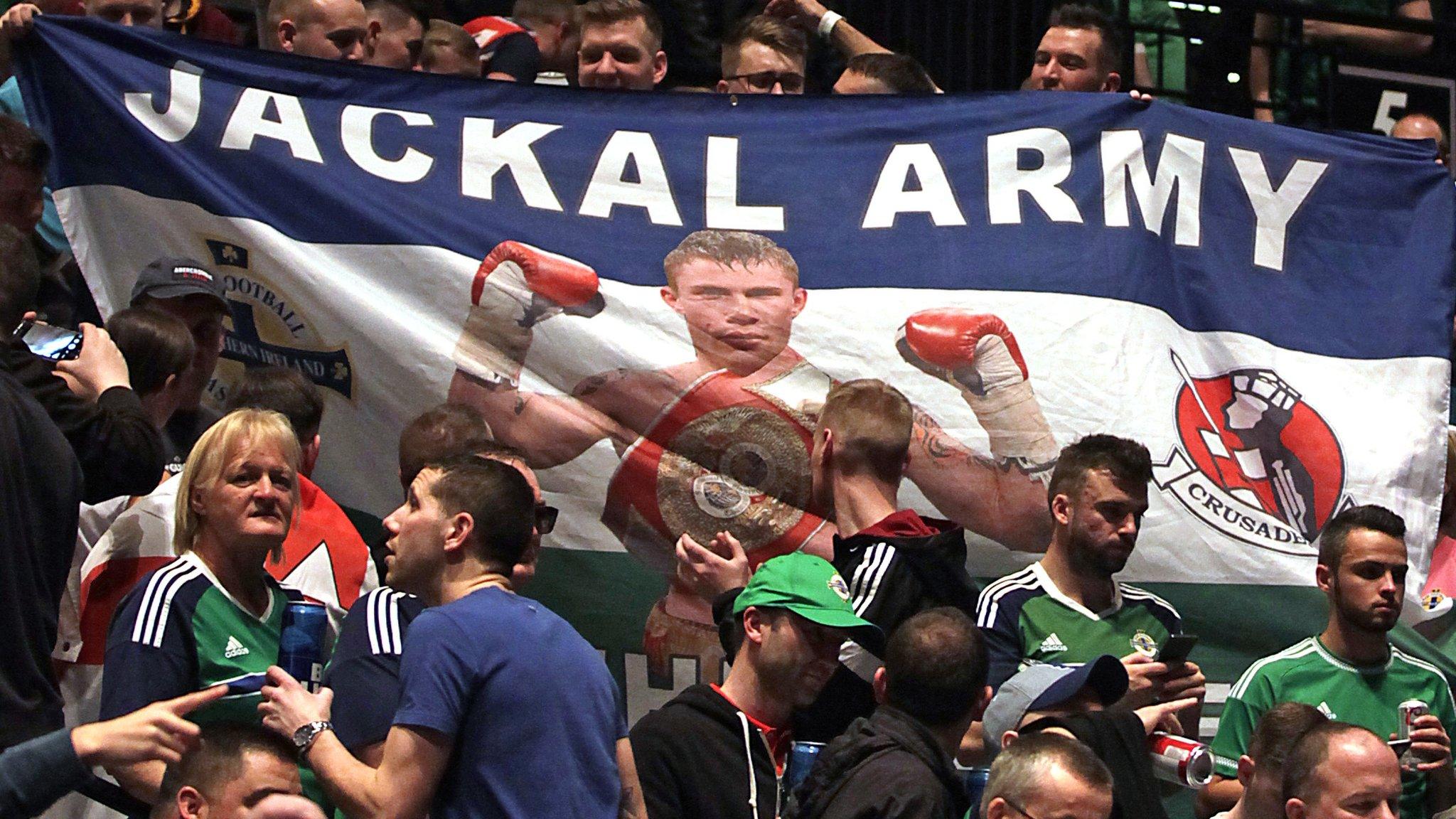
- Published27 December 2016
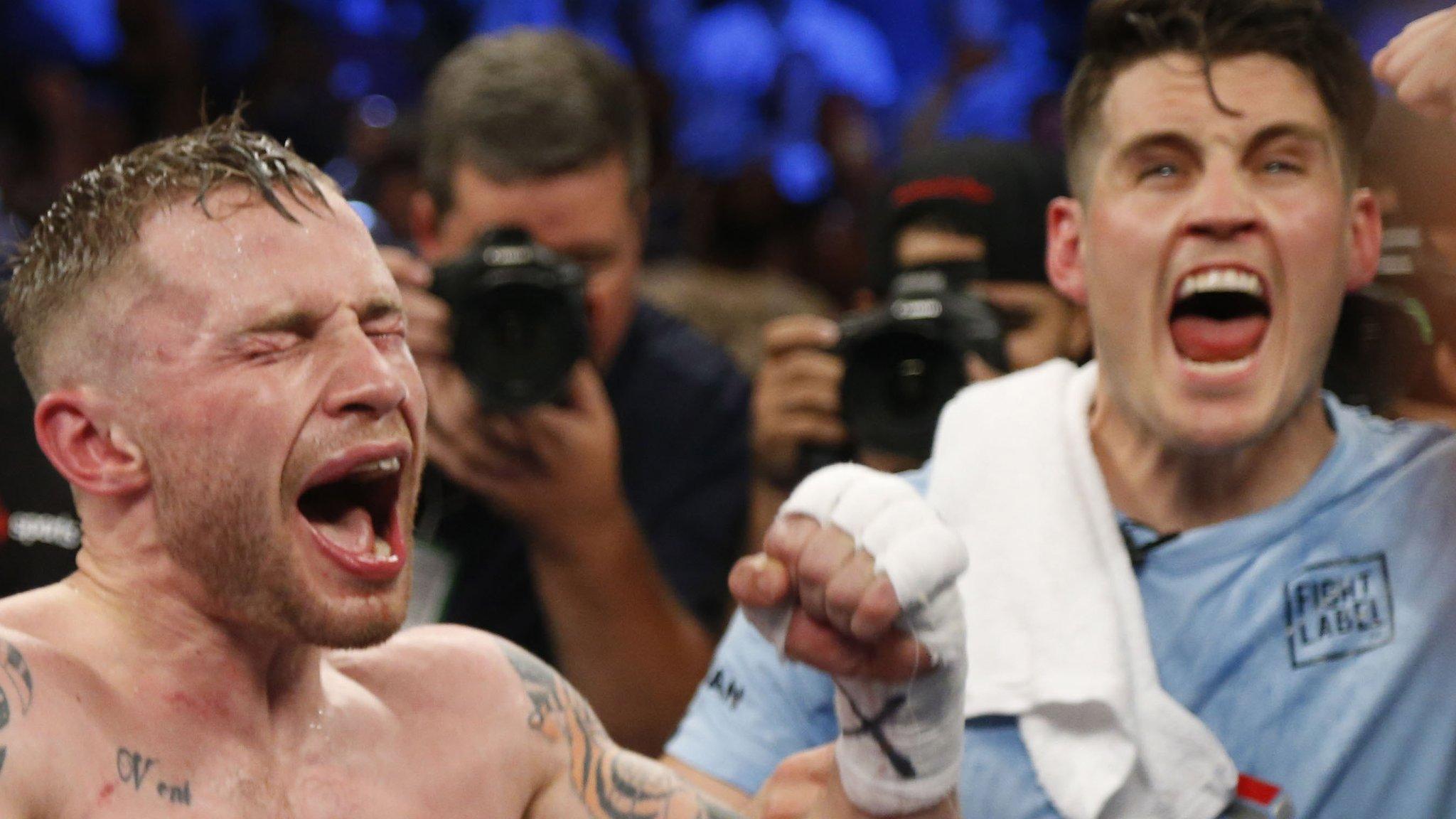
- Published8 June 2015
